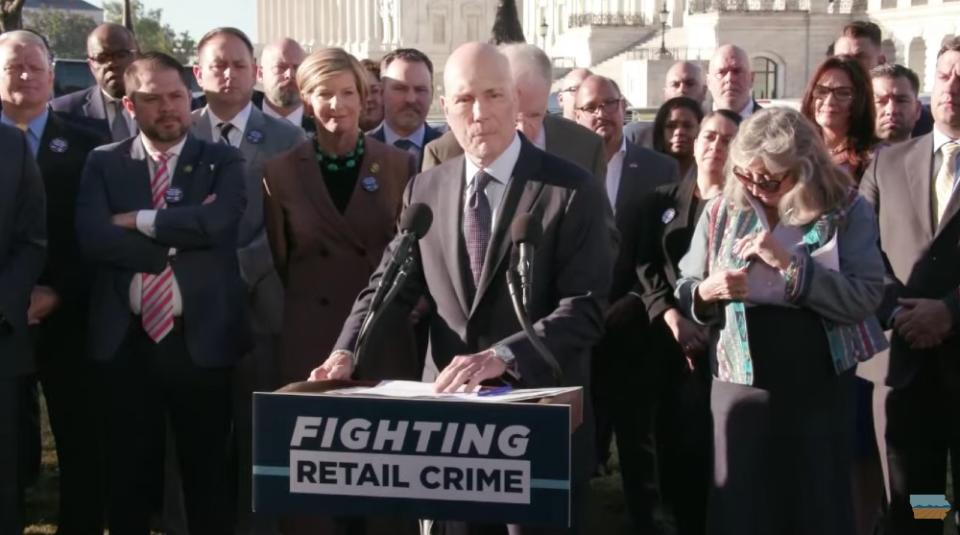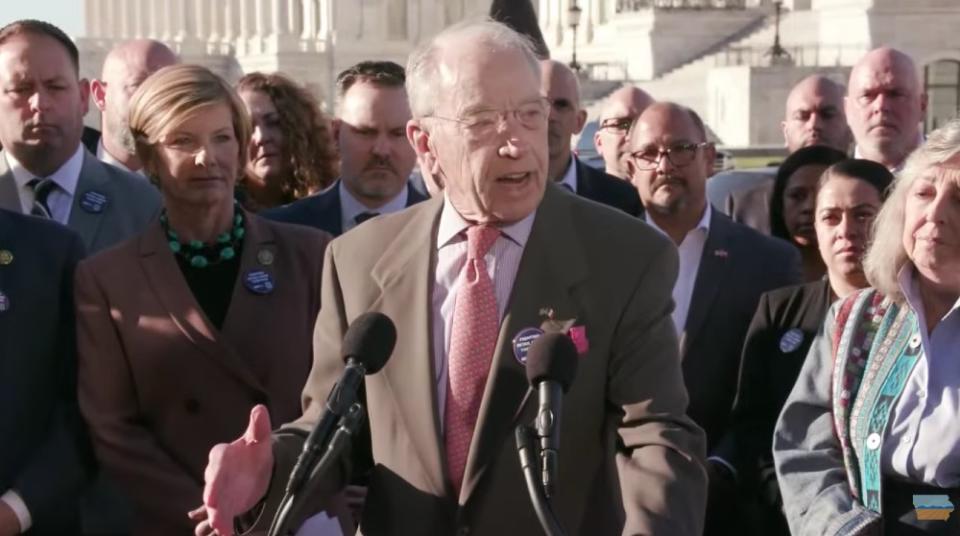Ross Shoplifters Mug for the Camera as Cops Arrest 2 in $12,000 Jeans Theft at Kohl’s
- Oops!Something went wrong.Please try again later.

One of three masked suspects who crammed socks and other merchandise into stolen bags at a California Ross store on Thursday said “Hey, Instagram!” to a shopper who captured the incident in a TikTok video.
And in Colorado, four suspects stole nearly $12,000 worth of jeans from a Kohl’s store in Aurora, according to police who said they grabbed merchandise by the handful before exiting the store without paying. Two individuals identified through anonymous tips were arrested and now face felony charges. Police said the same criminal ring is likely responsible for hitting the same store several times in the past month.
More from Sourcing Journal
Retail’s $95 billion crime problem is getting Washington’s attention.
House and Senate lawmakers convened Thursday at the nation’s capital alongside the National Retail Federation (NRF) and merchants to mark Fight Retail Crime Day and address the national shoplifting epidemic.
More than 73 brands signed a letter addressed to House and Senate leaders in support of the Combating Organized Retail Crime Act of 2023, a bipartisan bill introduced in February that would establish a national coordination center combining resources from state, federal and local law enforcement agencies, along with the retail community, to combat retail theft and organized crimes like smash-and-grabs.
“Today is a day of action on Capitol Hill—and it’s not only about the dollars involved here,” NRF CEO and president Matthew Shay said at a press conference outside of the U.S. Capitol building. “It is about, in some cases, the tragic loss of life, the violence, the aggression that’s playing out in these retail locations.”
According to NRF’s 2023 National Retail Security Survey, 67 percent of retailers have experienced more violence at the hands of shoplifters than they did a year ago. “Retailers have done everything they can to make their stores and their places of business safe,” he added. “In spite of all that, we still need additional help and additional support, and that’s what the Combating Organized Retail Crime Act will provide us.”
Cosponsored by 41 Congressional Democrats and 37 Republicans, the proposed law has gained strong bipartisan support. Retail shrink, including organized retail crime, passed $110 billion in 2022, and Sen. Chuck Grassley (R-Iowa) told attendees that the issue is a $1 billion problem for his home state alone. “But you also have to recognize not just the theft, but the danger to the employees, the cost to the consumers, and then the impact upon the individual retailers,” he said.

“It’s happening in every community,” Sen. Catherine Cortez Masto (D-Nev.) said. “I cannot walk out into my community, into a retail establishment without hearing from somebody that has experienced this.” A former prosecutor, Rep. David Joyce (R-Ohio) said he had seen the escalation of the issue firsthand. “In 20 years, this has only gotten worse,” he said, noting shoplifters’ increasing violence.
Rep. Dina Titus (D-Nev.) added that the problem doesn’t just impact big-box stores, but small businesses too. Fellow democrat and Nevada Rep. Susie Lee said organized retail crime impacts red and blue states equally, “And it’s bad for everyone. It’s bad for business.”
NRF and nearly 30 retailers also visited the offices of 60 Senators and members of Congress who haven’t yet backed the Combating Organized Retail Crime Act. The trade group’s national grassroots campaign has resulted in 4,000 messages sent to Congress urging lawmakers to support the bill.
Not everyone is convinced that crime is as big a problem as retailers claim it is, however.
Retailers have been “increasingly vocal” about organized retail theft, “in part to draw out government action” like the passage of the Combating Organized Retail Crime Act of 2023 (CORCA), William Blair equity research analysts wrote in a note last week.
“While theft is likely elevated, companies are also likely using the opportunity to draw attention away from margin headwinds in the form of higher promotions and weaker inventory management in recent quarters,” said the investment bank’s report on consumer specialty retail.
Despite the crime problem, retailers also face “increasing gross margin pressures from deleverage on lower demand, increasing promotions, and rising cost inflation,” according to William Blair analysts, who monitor Target, BJ’s Wholesale Club, Burlington, Costco, Five Below, Nordstrom, O’Reilly Automotive, TJX Companies, and Ulta Beauty.

William Blair sees shrink accounting for 2 percent of sales this year, which is 60 basis points higher than where it was before the pandemic. This amounts to an “incremental $30 billion in inventory losses,” or “exceeding $140 billion” altogether, it added.
Retail crime appeared to worsen around 2021 largely because shrink shrank when thousands of stores shut down during the worst of the pandemic, according to the analysts. “We view the increased shrink pressures in 2022 as more of a normalization to the historical average as pandemic-era benefits faded,” they wrote.
“While we expect shrink to remain elevated into 2024, the incremental impact is likely more contained than in recent years, given early signs of stability in shrink levels already in 2023 and some indication of over-exaggeration associated with more recent measures including closures,” they continued.
Store closings like Target’s could be a problem of underperformance rather than crime. Many of the locations Target is closing feature the smaller footprint it switched to back in 2018. “Target could be using shrink to mask other issues, including poor inventory management, which came to a head in 2022 following supply chain disruption, and is now exiting underperforming stores to boost overall margins,” according to William Blair’s equity research team.
William Blair analysts pointed to Walmart’s announcement that it was closing four smaller-format Chicago locations after claiming they lose “tens of millions of dollars a year with annual losses nearly doubling in just the last five years.” But unlike Target, Walmart didn’t blame crime and theft for the closures. It admitted that the smaller footprint, localized product assortment and new services didn’t resonate.
The analysts believe the federal government should act on retail crime, given that locking up products, and investing in more security cameras, anti-theft sensors and security guards have been “largely ineffective.”
“It seems really the only thing the government could do would be to go after ORC at higher levels,” analysts wrote, citing CORCA as a potential solution.

